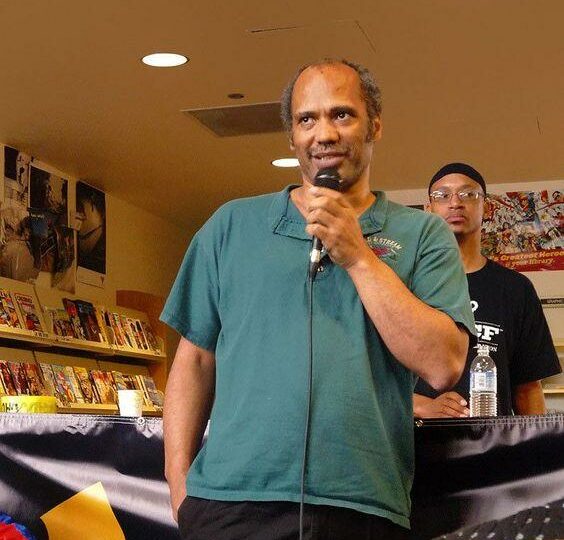Navigating through the unexpected turns of an exciting chess match as you start this fascinating trip through Emory Tate’s final chess tournament. Imagine a chessboard: Unaware that this game would be his last, Tate, a famous player renowned for his strategic acumen, made his moves in Milpitas, California.
His sudden exit from the board is mysterious, & as we learn more, each move becomes clearer like a chess piece. What made him depart during the competition? What was the urgent need he had for assistance? &, most puzzling of all is Emory Tate’s cause of death. Let’s examine the nuances of his last game, which had more stakes than any chess match could possibly represent.
Emory Tate: Chess Legend and Trailblazer
Image Credit – Chess.com
Emory Tate, affectionately known as “The Dark Bishop,” made a lasting impression on the American chess scene with his fascinating & aggressive play. Tate’s dominance at the chessboard was evident as he won six Indiana championships & five Armed Forces Championships. Even though he was not able to claim the title of Grandmaster, his bold actions & astute strategic thinking will always be remembered.
Tate’s impact continued into the following generation despite his own accomplishments, most notably via his son Andrew Tate. Celebrated for his dynamic gaming & his lasting influence on the chess world, Emory Tate is regarded as a legendary figure due to his passionate approach to the game & his involvement in developing future champions.
Here’s a biography table for Emory Tate:
| Full Name | Emory Andrew Tate II |
| Nickname | “The Dark Bishop” |
| Birth Date | December 27, 1958 |
| Birth Place | Chicago, Illinois, United States |
| Death Date | October 17, 2015 |
| Death Place | Milpitas, California, United States |
| Age at Death | 56 years old |
| Ethnicity | African-American |
| Nationality | American |
| Chess Title | International Master |
| Family | Father of Andrew Tate and Tristan Tate |
Emory Tate’s Early Life
Image Credit – Wikipedia
Emory Tate, one of nine siblings, was born in Chicago, Illinois, on December 27, 1958, & came from a vibrant family. His early interest in chess set the stage for an incredible adventure.
Tate, who grew up in a big family & had to handle the challenges of city life in Chicago, acquired a strategic mentality that would later characterize his aggressive chess playing style.
This developmental era paved the way for his subsequent pursuits & hinted at the lasting impression he would make as “The Dark Bishop” on the American chess scene.
Emory Tate’s Career: Journey of a Chess Maestro
Throughout his chess career, Emory Tate combined tactical skill with an unwavering will for win. While serving as a sergeant in the US Air Force, he developed his strategic sense, which he carried over to the game of chess, in addition to his linguistic prowess.
Tate won five U.S. Armed Forces Chess Championships & six Indiana State Championships. His aggressive style of play earned him the moniker “The Dark Bishop.” His contempt for chess machines revealed a deep dependence on ability & intuition. Tate’s status as a pioneer & chess maestro was cemented by his effect on the U.S. chess scene & the subsequent generation, even though he did not win the Grandmaster title.
Emory Tate’s Family
Image Credit – Pinterest
Emory Tate’s chess career & personal life were greatly influenced by his family. He left a long-lasting impact inside his own family by inspiring his sons Andrew & Tristan Tate to pursue their love of chess. Tate’s early circumstances, including living in a family with nine siblings, shaped his tenacity & strategic thinking, which in turn shaped his aggressive chess playing style. The Tate family’s passion of chess was woven together by a spectacular chess impact that had a lasting impression on the larger chess community.
Emory Tate’s Cause of Death
Here’s a detailed information about Emory Tate’s cause of death:
Emory Tate’s Final Chess Tournament
Emory Tate demonstrated his unwavering love for the game of chess by taking part in a tournament in Milpitas, California, on October 17, 2015. The chess world was unaware that this would be his last competition, capping an incredible career.
A Sudden Turn of Events
Renowned for his astute strategic thinking, Emory Tate, during the tournament, sat down facing the restrooms—an unremarkable scene for an amazing sequence of events. He abruptly abandoned the game during the first round, which set off a terrible series of events, which was an unexpected twist.
Urgent Call for Help
Emory Tate went back to his seat & said to a coworker that they should dial 911. The fact that he passed out shortly after making the request demonstrated the haste with which he was acting. The chess community, which included tournament participants, came together to provide first aid right away as they waited for emergency assistance to arrive.
Swift Response and Arrival of Emergency Services
Emergency personnel arrived to assist Emory Tate in 10 minutes after receiving the emergency call. As they were taking him to the hospital, things became serious despite the medical staff’s best attempts.
The Tragic Outcome
Unfortunately, Emory Tate’s struggle with an unexpected medical emergency came to an end when he passed away. Upon arriving at the hospital, he was declared deceased at the age of 56. The chess community was devastated to learn of his passing & mourned the loss of a player who not only made a lasting impression on the board but also on the hearts of those who looked up to him.
Cause of Death: A Heartbreaking Diagnosis
Subsequently, medical experts verified that Emory Tate’s sudden death was caused by a heart attack. This revelation underscored the unpredictable nature of life & the frailty of even the most powerful brains in the chess world, adding a dimension of sorrow to the anguish felt by the chess community.
Frequently Asked Questions
Here are some frequently asked questions about Emory Tate’s cause of death:
1. What did Emory Tate do to terminate his chess career tragically?
On October 17, 2015, he participated in a chess competition in Milpitas, California.
2. Before the events transpired, where did Emory Tate go for a short while during the tournament?
During his first game round, he used the toilet.
3. When Emory Tate got back to his seat, what did he do first?
He whispered to a coworker, asking them to dial 911.
4. What led to Emory Tate’s premature passing?
Subsequently, medical experts verified that he had experienced a myocardial infarction.
5. Despite the swift response of emergency services, what unfortunate outcome was reported upon reaching the hospital?
Emory Tate was pronounced dead at the age of 56.
Conclusion
In this article we’ve let you know about Emory Tate’s cause of death. The last note in the chess legacy of Emory Tate reverberates with a heartbreaking mixture of appreciation & grief. His last match, which included a heartbreaking checkmate & an unexpected health crisis, makes us consider how unpredictable life can be. The memory of a chess mastermind’s strategic acumen & love of the game endures as we say him goodbye.
Beyond the chess board, Emory Tate’s legacy serves as a constant reminder that the human spirit creates an enduring impression, even in a game where moves are planned & results are unpredictable. His last game, a sophisticated chess piece & life unpredictable interaction, is a tribute to the lasting influence one person can have on a community & the legacy that endures long after the chess clock stops.








